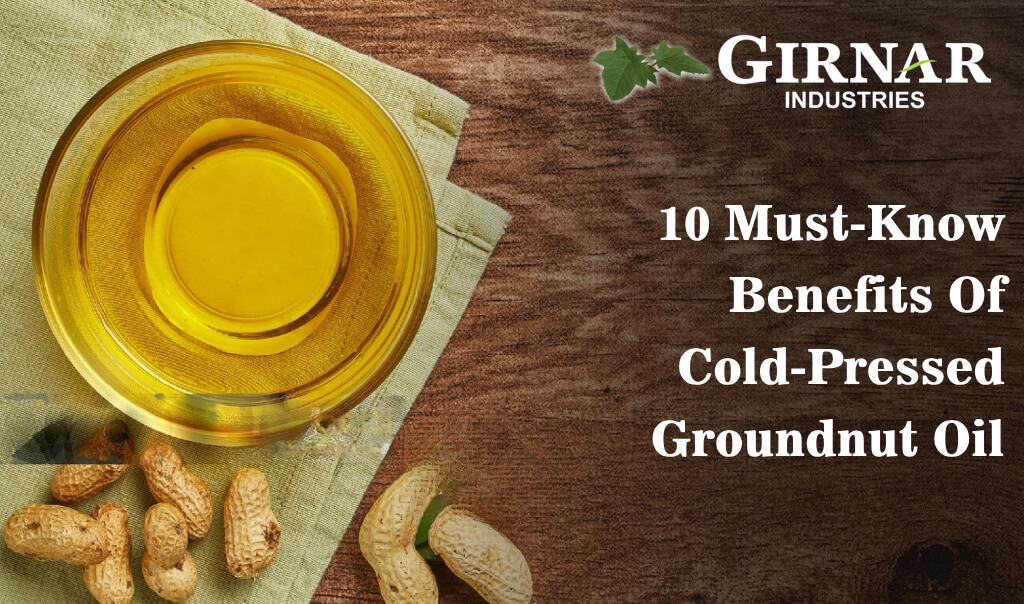Cold-pressed groundnut oil is a classic among food oils that is known for its many health benefits and wide range of uses in cooking. This oil stays naturally healthy because it was extracted using a traditional method that doesn’t use heat or chemicals. This makes it a popular choice for people who love cooking and health.
What is Cold-Pressed Groundnut Oil?
Cold-pressed groundnut oil, often known as peanut oil, is extracted mechanically from groundnuts or peanuts. The nuts are crushed at a low temperature to extract the oil without damaging their nutritious profile. This process preserves the oil’s inherent flavor, color, and nutrients, distinguishing it from refined versions.
10 Must-Know Benefits of Cold-Pressed Groundnut Oil
Heart Health Champion:
Cold-pressed groundnut oil is packed with nutrients and fatty acids that are good for your heart. It helps lower bad cholesterol (LDL) and boost good cholesterol (HDL), which reduces the risk of heart disease.
Abundance of Antioxidants:
Oxidative stress is fought and free radicals are avoided by this oil’s powerful antioxidants, which include resveratrol, tocopherol, and flavonoids. These vitamins help keep you from getting old and make your immune system stronger.
Stable at High Temperatures:
The smoke point of cold-pressed groundnut oil is higher than that of refined oils. This makes it perfect for high-heat cooking methods like frying and deep-frying without turning into dangerous compounds.
Rich in Vitamin E:
As a skin-beneficial substance, vitamin E in groundnut oil helps cells grow back and protects against UV damage. It provides a glowing skin tone when applied on the outside and inside.
Balanced Fatty Acid Profile:
The amount of both omega-6 and omega-3 fatty acids in this oil is just right. These kinds of fatty acids are crucial for brain health, decreasing inflammatory conditions, and supporting general health.
Diabetes Management:
Studies suggest that having some cold-pressed groundnut oil can help control blood sugar levels since it has a low glycemic index and makes insulin work better.
Nutrient Retention:
The nutritional value of the oil, including vital minerals and vitamins, is preserved during cold-press extraction because the oil is subjected to minimum heat.
Improves Digestive Health:
Adding groundnut oil as a supplement to your diet can help the body address food better and receive nutrients better since it is lightweight and simple to digest.
Boosts Hair Health:
When you put cold-pressed groundnut oil on your head, it feeds the scalp, strengthens hair follicles, stops hair from breaking, and stimulates healthy, shiny hair growth.
Versatile Culinary Uses:
Cold-pressed groundnut oil is an adaptable ingredient that can be utilized in salad dressings, stir-fries, marinades, and baking due to its distinctive hazelnut flavour and high smoke point.
For more information:- cold pressed castor oil benefits
Role Of Cold-Pressed Groundnut Oil Into Your Lifestyle
While relishing the benefits of cold-pressed groundnut oil, it’s crucial to integrate it wisely into your daily routine:
Cooking Medium:
Acquire it for deep-frying, stir-frying, and frying on account of its elevated smoke point.
Salad Dressing:
Its salty taste helps soups or sauces taste better, which makes them more enjoyable.
Baking:
For a healthy twist, implement cold-pressed groundnut oil instead of butter or other oils in baking recipes.
Massage Oil:
It is a great option for massage due to its nourishing characteristics, which boost skin wellness.
Dietary Supplement:
In terms of your general health, just one teaspoon every day can make a significant contribution.
Conclusion
Cold-pressed groundnut oil has many health benefits as well as beauty and cooking benefits. Moderation is important, though, because too much of something can cause you to eat too many calories. Adding this oil to a healthy diet can improve your health as a whole.
FAQ’S
What is the difference between cold-pressed and refined groundnut oil?
Cold-pressed groundnut oil and refined groundnut oil differ significantly in their extraction methods and processing. Cold-pressed oil is extracted mechanically, without heat or chemicals, preserving nutrients and flavors. In contrast, refined oil undergoes processes like bleaching and deodorizing, eliminating impurities but also stripping away some natural compounds.
Which type of groundnut oil is best?
Determining the best type of groundnut oil depends on personal preferences and specific usage. Cold-pressed groundnut oil, due to its natural extraction preserving nutrients and flavors, is preferred for its richer taste and higher nutrient content. It's ideal for dressings, dips, and low-heat cooking to retain its health benefits. Refined groundnut oil, with a higher smoke point, suits high-heat cooking methods.
What is pure groundnut oil?
Pure groundnut oil refers to oil that is solely extracted from groundnuts (peanuts) without blending or mixing with other oils or substances. It's obtained through mechanical processes like pressing or crushing the nuts, without involving heat or chemicals that could alter its natural properties. This unadulterated form retains the inherent flavors, nutrients, and characteristics of the groundnuts, ensuring a genuine, unblended product.
What are the disadvantages of groundnut oil?
While groundnut oil offers numerous benefits, it has a few potential drawbacks. Due to its high omega-6 fatty acid content, excessive consumption may upset the balance of omega-3 to omega-6 in the diet, contributing to inflammation if not balanced with omega-3-rich foods. Additionally, individuals allergic to peanuts should avoid groundnut oil to prevent allergic reactions.
Which oil is the best for cooking?
The best oil for cooking varies based on cooking methods and health considerations. For low to medium heat, cold-pressed groundnut oil stands out due to its rich flavor and nutrient retention. Olive oil, especially extra virgin, is great for light sautéing and dressings. High-heat cooking benefits from oils with high smoke points like refined groundnut or avocado oil.


